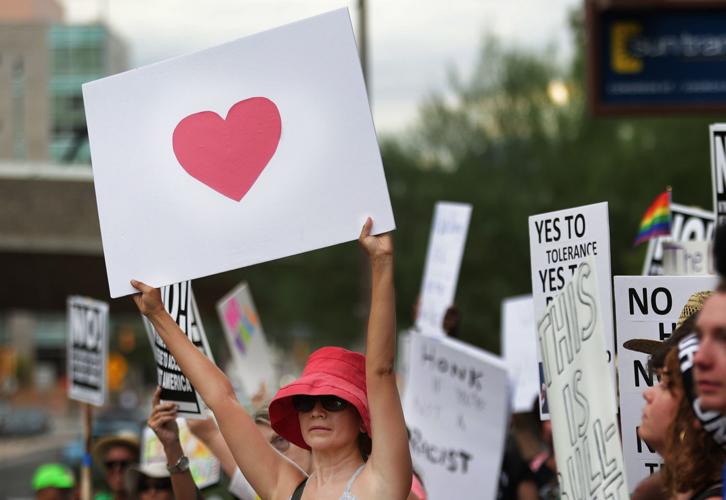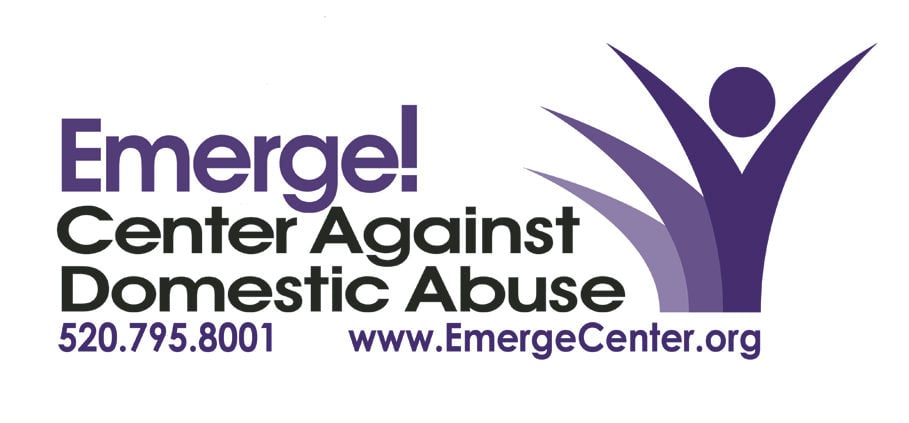If you saw a lot of purple this October, it was for a good reason — the 30th anniversary of Domestic Violence Awareness Month.
The Centers for Disease Control and Prevention estimate that one in four women and one in nine men "have experienced contact sexual violence, physical violence, and/or stalking by an intimate partner in their lifetime."
We need to be talking about this.
That's why we spoke with a handful of Tucsonans who have experience dealing with domestic violence personally or professionally.
We want to know how to help — what to do if someone we love finds herself in an abusive relationship.
Here are five things you can do to help someone in a domestic abuse situation.
1. Get educated
It's important to know how to spot red flags, whether a relationship is already abusive or heading in that direction. Tucson's Emerge! Center Against Domestic Abuse has a list of warning signs to look for, from controlling behaviors to threats of violence.
Isolation
Deanna Lopez, a victim advocate with the Pima County Attorney's Office Victim Services Division, said abusers often use isolation to eliminate significant relationships in a victim's life.
Isolation may also occur as shame and embarrassment besiege victims, said Kelly Burroughs, the vice president of clinical services for Jewish Family and Children's Services, a local organization that provides counseling and trauma services for clients of all faiths in the community. Keeping quiet can perpetuate the abuse.
"If you have someone that you care about and they're in a relationship that becomes very isolated, get very curious around that and don't just brush it off that they don't call you back," Burroughs said. "Still be a good friend in those times you feel like your calls aren't getting returned ... recognize that there might be something else going on."
Escalation
The Pima County Attorney's Office Victim Services Division responds to domestic violence situations at the bequest of law enforcement and appear with victims at court hearings. Katie Lawler, lead victim advocate, said it's important to watch for escalation — for example, verbal abuse progressing to physical abuse.
"I always think one of the misconceptions about domestic violence is that it's just about acts of harm or acts of violence..." said Amalia Mora, the program coordinator for the University of Arizona's Consortium on Gender-Based Violence. "I think oftentimes it's not really recognized that domestic violence also encompasses attitudes that really devalue women or anyone who is perceived to be weak in the relationship."
The new UA consortium will combine academic research with community outreach and resources to tackle issues such as domestic violence, assault and harassment, Mora said. The consortium is hosting its first conference from 6:30-9 p.m. Friday, Nov. 3 and 9:30 a.m. to 3:30 p.m. on Saturday, Nov. 4.
Register for the free conference to learn more about how to create programs that support survivors and address attitudes that perpetuate violence.
Mora added that abuse doesn't always happen immediately in a relationship and often the victim doesn't even realize the relationship is abusive.
"Though often not addressed in the national conversation, domestic violence is as prevalent as sexual violence within the college setting," she said. "In fact, college-aged women experience a higher rate of domestic violence (also referred to as intimate partner violence) than any other age group."
2. Listen
Jenna Herder said it took her several years to realize she had to get out of her abusive relationship.
But before she came to that realization on her own, she said she wouldn't accept much help. She wanted to make it work.
Still, her parents were available to her during those long years.
"The advice that I would have for friends and family trying to help someone in an abusive relationship is listen to them and support them if they come to you and want to talk," she wrote in an email. "If they are ready to leave the relationship and ask you for help, then of course help them. But pressuring and nagging for them to get out is going to do nothing but add to an already stressful situation, because they won't leave until they're good and ready. Or until the abuser finally kills them."
Herder now owns Combat Krav Maga: Unit 545 — Krav Maga is a self-defense system — and teaches women to defend themselves.
Everyone else we spoke to agreed with her take: You need to listen.
"Our first reaction is to say, 'you gotta get out of there and leave,' but there are so many complex reasons why people don't leave ..." Burroughs said. "So many times we want to jump in and help fix things, and it's so complex. It's not just that somebody got hit."
Those issues include where to go, children, finances, shared friends, religious beliefs and a fear that no one will believe the truth, Burroughs added.
You can help just by believing your friend, she said.
"I think what's really hard for people to understand looking from the outside in is that you are in love with the person doing this to you, so there are still all of those emotions," Lopez said.
3. Offer information
Because abusive relationships rob the victim of power, concerned friends shouldn't tell a victim what to do.
Instead, provide resources and information.
"Our model is focused on empowerment and helping them make those decisions to give power and control back to their lives," Lawler said. "The victim-blaming piece is what we want to stay away from. No matter what goes on in a relationship, no one deserves to be in a situation where they are fearing for their life or being injured or hurt by someone they love."
There's nothing wrong with telling a friend or family member, "Hey, I'm really worried about you" or "You don't seem like yourself. I've noticed you're not going out like you are and you're not smiling and upbeat like you were," Lawler said.
This is a sensitive way to broach the topic.
"It's always best to be a good listener and to introduce the idea of seeking the guidance of professionals who might lead them in a good direction or enable them to understand and process their situation better than you can," Mora said. "Many victims of domestic abuse love their partners and/or want to continue to stay with them, and so if you present the idea of professional assistance as a way of helping your friend process what they are experiencing — rather than a means of leaving the relationship — it might make them more likely to seek help."
Resources to share
Lawler suggests sharing the Emerge! 24/7 crisis line number — 795-4266 or 888-428-0101 toll free. Victims can also contact the Victim Services Division of the Pima County Attorney's Office from 8 a.m. to 5 p.m. Monday through Friday to talk to an advocate who can answer questions or ask for an order of protection. That number is 724-5525.
Emerge! Center Against Domestic Abuse has a confidential emergency shelter and can help with necessities, planning and crisis intervention, among other things. The Southern Arizona AIDS Foundation also has a crisis line (624-0348 or 1-800-553-9387 toll free) and a short-term shelter for emergency situations, specifically for LGBT victims.
4. Take action — but be smart about it
Lopez said that victim advocates often respond to domestic violence situations when someone else — not the victim — called 911.
If you hear screaming and arguing next door, you can call 911, she said.
"Anytime a person is concerned for the safety and well-being of another person, they can call 911 at any time," Lawler said. "I think people don't know what to do. If you're hearing stuff go on and you're worried, you absolutely can call 911 and report it."
Be safe
Helping someone in a domestic violence situation does require wisdom on your part. If the abuser knows you and where you live, you shouldn't offer your home as a place for the victim to stay.
In its list of ways to help, Emerge! warns against confronting the abuser or making it known that you know about the abuse. Be discreet.
More than one person we spoke with said preparing to leave and the transition are the most dangerous points in a domestic violence situation.
You can help make a safety plan, including where to stay, who to trust and what to bring. Burroughs said identification and other important documents, along with medications, are key to remember.
"Be really careful about emails and text message and Facebook posts..." she said. "With the social media piece, when we're being helpers, we need to be aware that oftentimes the abuser ... they will have password to email and Facebook and can check text messages and voicemails."
Don't deal with this alone
Reach out for guidance, Mora said, naming Emerge!, the UA consortium and the Southern Arizona AIDS Foundation as options.
"Don't take the reigns in the situation because you could put yourself in danger as well as your friend or coworker," she said.
5. Stay for the long haul
Herder said that extra support is especially essential after a victim chooses to leave the abuser.
"Give love and do not be judgmental or question them about why they allowed such things to happen to them," she wrote. "They are very fragile and have enough guilt already about allowing themselves to be abused that they don't need someone else's judgment on top of that."
Ending a relationship often also means grieving the hope of what it could have been, Burroughs said.
"The trauma doesn't end when the event ends," she said. "We can help with therapy and helping to recognize what healthy relationships look like."
As a parent, you can help indirectly in the way that you teach your kids.
"Raise your female children to believe they should be safe and in a loving environment and model that and have discussions with your male children about behavior toward females," Lawler said.
Coming out of an abusive relationship takes courage and requires support.
"Friends and family need to be aware that physical wounds heal, and you might not see them anymore, but the emotional wounds are on scene and run very deep," Herder said. "It's been about five or six years now that I've been out of my relationship, and I'm still in the process of healing, but I am so much stronger for what I went through and survived."





